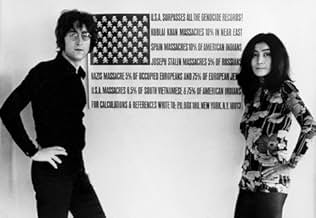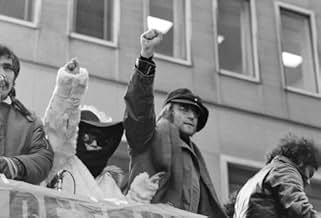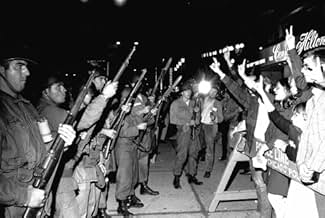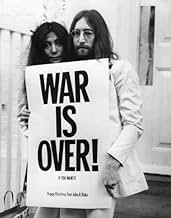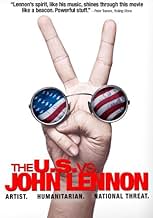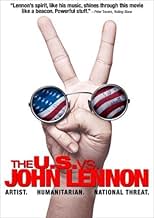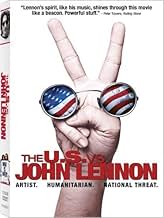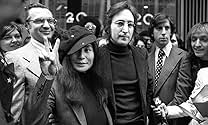IMDb RATING
7.3/10
5.7K
YOUR RATING
A documentary on the life of John Lennon, with a focus on the time in his life when he transformed from a musician into an antiwar activist.A documentary on the life of John Lennon, with a focus on the time in his life when he transformed from a musician into an antiwar activist.A documentary on the life of John Lennon, with a focus on the time in his life when he transformed from a musician into an antiwar activist.
- Awards
- 2 nominations
John Lennon
- Self
- (archive footage)
- Directors
- Writers
- All cast & crew
- Production, box office & more at IMDbPro
Storyline
Did you know
- Quotes
Gore Vidal: Patriotism is the last refuge of the scoundrel.
- SoundtracksJohn Sinclair
Written by John Lennon
Performed by John Lennon
Courtesy of Capitol Records
Under license from EMI Film & Television Music
Featured review
One of the younger reviewers commented:
"I couldn't help but compare the era and social climate around this movie to what we are experiencing today. I am disturbed and disappointed. Why is it that it seemed as if there were loads more people being active in what they believed back in those days. I understand that it was a different time, and many in the world were just learning to use their voices... Perhaps we feel that we just don't know enough about a subject to get behind it and speak out? ... Perhaps large protests are just being overlooked because we as viewers or the media is over it... I am just wondering why I haven't done more. Why does it seem as if people today (not just my "generation" or my "community") are fearful or apathetic towards fighting for what they think is right? I don't want to preach or be dramatic here - I'm not telling you to view things my/their/our/its/his/her way. I'm just saying, I can't imagine that we've gone through life without seeing some sort of injustice - there has to be something you've seen that you think is wrong... why not say something about it? Is being charitable enough anymore? Awareness is key. Why is there this silence amongst us?"
Perhaps I'm being too simplistic, but I've often thought as a survivor of the Viet-Nam era, that the main reason we haven't seen protests of the magnitude depicted in The US vs John Lennon in recent times is simply the absence of the draft. Plenty of people again object to the war situation, but without the threat of involuntary servitude there simply is no critical mass. The fear of self, friends, and family being rounded up and shot proved great motivation to get people out in the streets back then. The censorship of the media imposed since Viet-Nam (embedded journalists, qv) has also helped still the voices.
So at the very least, this film has helped present an historical perspective all but absent in the present day. Viet-Nam so divided the country that the divisions remain today. Yet that war is curiously neglected in our educational curricula.
Beyond that is revealed a portrait of John Lennon, artist and young man. Lennon, the single one of the Four who strove at great personal cost to better the world with far more than silly love songs is revealed here in a montage of film and stills that conveys far more than the press of the time was able or wiling to.
The film opens with footage from his 1971 appearance at the John Sinclair Freedom Rally at Crisler Area in Ann Arbor, Michigan. As a former UM Ann Arbor Student I particularly appreciate how the producers of the film illustrate the pivotal nature of that event. At the time the event seemed like a big deal locally, but one that was lost amongst the din of social commotion. As close as I was geographically, I didn't realize then just how influential Lennon's (or Sinclair's) involvement was in the successful movement to end the war.
I suggest that any student (young or older) of how that peace movement progressed back then should see this film. Serious students should see it more than once. In addition to the collection of seldom seen film footage, there is a very fine sound track. See the film on the big screen if you can. I'll put my order in for the DVD as soon as it can be had, but the big screen, hi-fi version rocks.
"I couldn't help but compare the era and social climate around this movie to what we are experiencing today. I am disturbed and disappointed. Why is it that it seemed as if there were loads more people being active in what they believed back in those days. I understand that it was a different time, and many in the world were just learning to use their voices... Perhaps we feel that we just don't know enough about a subject to get behind it and speak out? ... Perhaps large protests are just being overlooked because we as viewers or the media is over it... I am just wondering why I haven't done more. Why does it seem as if people today (not just my "generation" or my "community") are fearful or apathetic towards fighting for what they think is right? I don't want to preach or be dramatic here - I'm not telling you to view things my/their/our/its/his/her way. I'm just saying, I can't imagine that we've gone through life without seeing some sort of injustice - there has to be something you've seen that you think is wrong... why not say something about it? Is being charitable enough anymore? Awareness is key. Why is there this silence amongst us?"
Perhaps I'm being too simplistic, but I've often thought as a survivor of the Viet-Nam era, that the main reason we haven't seen protests of the magnitude depicted in The US vs John Lennon in recent times is simply the absence of the draft. Plenty of people again object to the war situation, but without the threat of involuntary servitude there simply is no critical mass. The fear of self, friends, and family being rounded up and shot proved great motivation to get people out in the streets back then. The censorship of the media imposed since Viet-Nam (embedded journalists, qv) has also helped still the voices.
So at the very least, this film has helped present an historical perspective all but absent in the present day. Viet-Nam so divided the country that the divisions remain today. Yet that war is curiously neglected in our educational curricula.
Beyond that is revealed a portrait of John Lennon, artist and young man. Lennon, the single one of the Four who strove at great personal cost to better the world with far more than silly love songs is revealed here in a montage of film and stills that conveys far more than the press of the time was able or wiling to.
The film opens with footage from his 1971 appearance at the John Sinclair Freedom Rally at Crisler Area in Ann Arbor, Michigan. As a former UM Ann Arbor Student I particularly appreciate how the producers of the film illustrate the pivotal nature of that event. At the time the event seemed like a big deal locally, but one that was lost amongst the din of social commotion. As close as I was geographically, I didn't realize then just how influential Lennon's (or Sinclair's) involvement was in the successful movement to end the war.
I suggest that any student (young or older) of how that peace movement progressed back then should see this film. Serious students should see it more than once. In addition to the collection of seldom seen film footage, there is a very fine sound track. See the film on the big screen if you can. I'll put my order in for the DVD as soon as it can be had, but the big screen, hi-fi version rocks.
- klofkorn-1
- Oct 14, 2006
- Permalink
- How long is The U.S. vs. John Lennon?Powered by Alexa
Details
- Release date
- Country of origin
- Language
- Also known as
- Los EE.UU. contra John Lennon
- Production companies
- See more company credits at IMDbPro
Box office
- Gross US & Canada
- $1,109,146
- Opening weekend US & Canada
- $69,143
- Sep 17, 2006
- Gross worldwide
- $1,408,065
- Runtime1 hour 39 minutes
- Color
- Aspect ratio
- 1.78 : 1
Contribute to this page
Suggest an edit or add missing content

Top Gap
By what name was The U.S. vs. John Lennon (2006) officially released in India in English?
Answer

